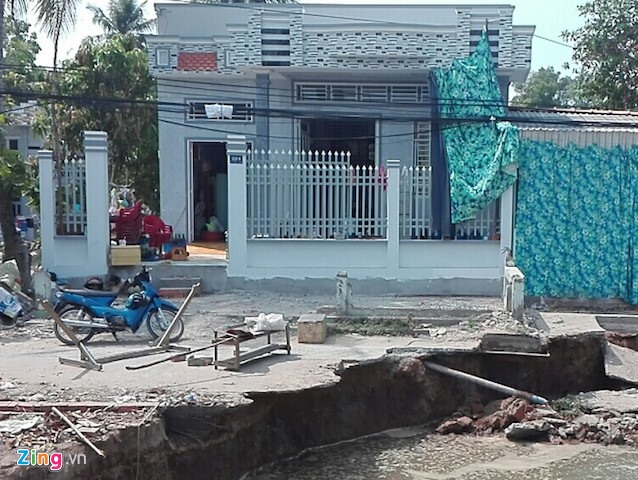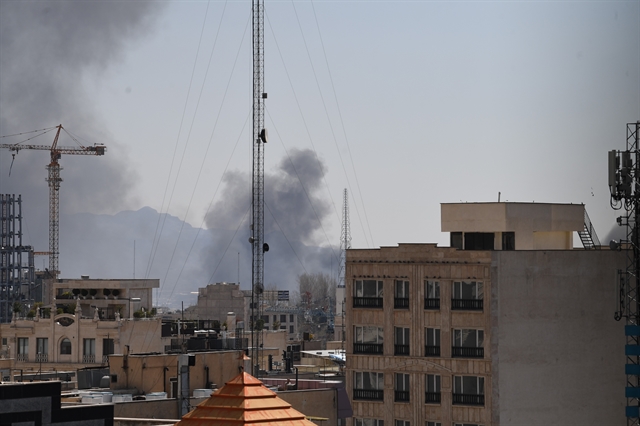 Society
Society

The People’s Committee of the southernmost province of Cà Mau has asked the Government to provide VNĐ300 billion (US$12.7 million) to move locals from landslide-prone areas to new residential areas.
 |
| The People’s Committee of the southernmost province of Cà Mau has asked the Government to provide VNĐ300 billion (US$12.7 million) to move locals from landslide-prone areas to new residential areas.– Photo zing.vn |
HCM CITY – The People’s Committee of the southernmost province of Cà Mau has asked the Government to provide VNĐ300 billion (US$12.7 million) to move locals from landslide-prone areas to new residential areas.
The funds will be used to speed up construction of new residential areas for households living in erosion-prone areas along the river in Hàng Vịnh Commune and Năm Căn District.
Under the plan, some 356 out of 1,200 households will be urgently relocated to new areas.
Tô Hoài Phương, chairman of Năm Căn District’s People’s Committee, said that heavy rains had caused many landslides in the region.
He said that authorities must closely monitor weather conditions and issue warnings about landslide-prone areas so that residents can move to a safe area.
Coastal districts in the province usually suffer the worst impact of climate change. Năm Căn, Ngọc Hiển and Đầm Dơi districts, in particular, were hit by landslides at different levels, according to the provincial Department of Agriculture and Rural Development.
Since the beginning of last year, 540m of land have eroded and 43m of riverbank have collapsed, affecting over 320ha of aquaculture, property and residents’ lives.
Provincial authorities do not have specific statistics on the extent of damage caused by the disaster.
Last year, Cà Mau Province proposed providing aid of VNĐ120 billion (US$5.27 million) to relocate 500 households at Vàm Xoáy and Rạch Gốc seagate in Ngọc Hiển District.
By 2025, Cà Mau Province will need VNĐ1, 200 billion (US$52.7 million) to evacuate nearly 5,700 households from landslide-prone areas to a safe place.
The same situation is occurring in Đồng Tháp Province. More than 5,900 households living in landslide-prone areas should be relocated, according to the province’s People’s Committee.
At least 900 out of more than 5,900 households need to relocate immediately, but many will have to live in the tents or in their relatives’ houses because of the lack of residential housing.
Meanwhile, about 1,540 households living in areas with a high risk of landslides need to relocate soon.
The province has asked the asked the Government to provide about VNĐ660 billion (US$28 million) to move locals from landslide-prone areas to safe places as well as build new residential areas.
Since the beginning of this year, nine landslides have damaged 163km of land along Tiền River’s bank in the province, and caused losses of over VNĐ172 million ($7,530).
Thanh Bình District, Hồng Ngự Town and Cao Lãnh City have been the most affected by erosion.
The province plans to deal with eroded areas along Tiền River’s bank in Thanh Bình District’s Bình Thành Commune and Châu Thành District’s An Hiệp Commune.
This will include building an embankment between Thanh Bình District’s Bình Thành Commune and Cao Lãnh District’s Phong Mỹ Commune, and implementing the second phase of the project on extending a 460m section of embankment in Hồng Ngự District’s Thường Thới Tiền Commune.
The province has asked the districts’ people’s committees to install warning signs and raise awareness about erosion prevention among local residents.
Between 2005 and 2017, the province recorded 25 eroded sites along the Tiền River, covering an area of 305ha, according to a report from the province’s Department of Natural Resources and Environment.
The province provided VNĐ350 billion ($15.3 million) in funds to move locals from landslide areas to new residential areas. — VNS




